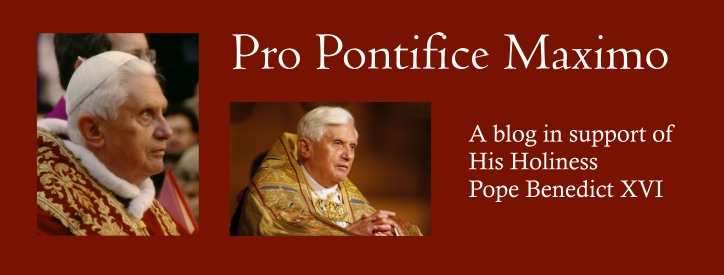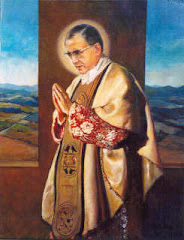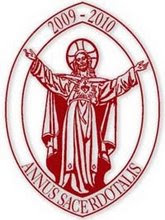A letter from our Parish Priest to the local Catholic newspaper, the Southern Cross. Unfortunately, I cannot find the letter, online, to which this was a response but it was of the usual 'let's do things our way' variety which I think can be seen from some of the things on which Fr Thomas comments in his letter.
Distinguishing the changeable from the fixed
23 September 2010 | by Letters Editor
Fr Thomas Gibson, Kensington, Johannesburg
Regarding Mervyn Pollit’s letter “Church Crisis” (August 18), I would like to share with all The Southern Cross readers my point of view.
1) No doubt we are immersed in a crisis. However, in my Parish I can say that not one practising Catholic with a minimum of formation has left the Church because of this. On the contrary, I would say that it has encouraged them to be more faithful.
2) I realise that if a member of the Catholic Church is able to say that “the laity will no longer allow a handful of clergy in the Vatican to dictate to us”, that person is going through a serious crisis in his belief, probably out of ignorance of what the Catholic Church is.
3) Before we reach Vatican Council III, we need to assimilate and put into practice the teachings of Vatican Council II, especially what Lumen Gentium has taught about the kind of Church our founder (Jesus Christ) wanted: Hierarchy (Pope, bishops, priests, deacons), religious and lay people, each one with his/her specific role.
4) We need to distinguish in the life of the Church those things that are “changeable” from those that are not. No one in the Church, not even Pope Benedict or a Vatican Council III, can change the indissolubility of marriage, the moral teachings regarding contraception or the nowadays frequent issue of the ordination of woman.
May these words of Pope John Paul II illustrate what I am saying: “The Church does not have any power to confer priestly ordination to women. This affirmation should be considered definitive for all the faithful of the Church” (Letter Ordinatio sacerdotalis; May 22, 1994) Why can’t we change these issues? To put it in a simple way, because it’s in the Gospel (explicitly or implicitly).
The discipline of priestly celibacy could be changed, but it would be going backwards (to understand this I recommend reading Paul VI’s Encyclical Letter Sacerdotalis Coelibatus; June 24, 1967).
5) If we look around we see thousands of different Christian denominations. In the origin of this splitting process we always find the rejection of some of these “unchangeable” issues.
The divorce of Henry VIII in the case of the Anglicans is well known by all. That’s why I start worrying when I see people claiming changes that no one in the Church can concede. I cannot avoid thinking that a new split is coming or has already taken place.
The priestly prayer of Jesus at the Last Supper is always actual: “I pray not only for them, but also for those who believe in me because of their message. I pray that they may all be one. Father! May they be in us, just as you are in me and I am in you. May they be one, so that the world will believe that you sent me” (John 17, 20-21)
Salve Regina
1 hour ago





